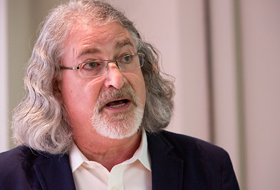Renowned King’s College London Medical Sociologist Visits Carolina

Nikolas Rose, professor of sociology and head of the Department of Social Science, Health and Medicine at King’s College London, visited Carolina for a week in April to deliver a lecture, meet with faculty, staff and students to discuss his areas of scholarship and to explore collaborations.
A strategic alliance was formally established by UNC and King’s in 2006, initiated between UNC’s College of Arts and Sciences and King’s School of Arts and Humanities and School of Social Science and Public Policy. The alliance continues to grow and include additional schools and disciplines campus-wide on both sides, including joint activity in the medical humanities.
As head of the newly established social medicine department at King’s, Rose has been developing an interdisciplinary department, bringing together some of the world’s leading experts in areas including anthropology, bioethics, gerontology, global health and medical sociology.
“Among our early reasons for inviting Professor Rose to campus was the simple fact that so many of us have found his work from the last decade on ‘biopolitics’ to be so important to our own thinking,” says Barry Saunders, associate professor of social medicine in the UNC School of Medicine.
Saunders introduced Rose at a public lecture delivered during his visit. Rose presented “A New Sociology for a New Century? Revitalising the Human Sciences” at the University of North Carolina at Chapel Hill on Friday, April 26, addressing the emerging relations between the biological sciences, those sciences of “life itself” and the human and social sciences. The lecture was sponsored by the Institute for the Arts and Humanities, UNC Department of Social Medicine, College of Arts & Sciences Interdisciplinary Initiatives and the Center for Bioethics.
Saunders notes that Rose’s work on biomedicalization and biosocialities has influenced courses at the UNC School of Medicine and the UNC Honors Program Interdisciplinary Minor in Medicine, Literature and Culture.
Rose originally trained as a biologist before transitioning to psychology and then to sociology. After 10 years at Goldsmiths College, where he was head of sociology and pro-warden for research, he joined the London School of Economics (LSE) in 2002 and was convener of the Department of Sociology from 2002 to 2006 and Martin White Professor of Sociology. He founded the BIOS Centre for the Study of Bioscience, Biomedicine, Biotechnology and Society at LSE, and was its director since its inception in 2003.
Rose has published widely on the social and political history of the human sciences, on the genealogy of subjectivity, on the history of empirical thought in sociology, on law and criminology and on changing rationalities and techniques of political power.
“He has had an extraordinarily interesting career moving across the disciplines: from undergraduate studies that combined biology, including close work at laboratory benches and on animal bodies, with animal behavior and human psychology,” says Saunders. “From there he moved through an extensive and distinctive arc of engagements as a sociologist that produced a body of writing that most of us have only engaged a few parts of.”
Rose has published widely on the structures of governmental power and the use of bioscientific methods and expertise to shape the politics of “life itself.”
His most recent book, Neuro (Princeton University Press, 2013,with coauthor Joelle Abi-Rached), examines the ways neurobiological conceptions of personhood are influencing everything from child rearing to criminal justice, and are transforming the ways we “know ourselves” as human beings.
“The [book] has a forward-looking and even hopeful cast, a concern with emergence– our emergence: with forms of human that we are becoming,” notes Saunders.
Article reposted from UNC Global.
